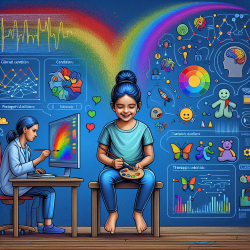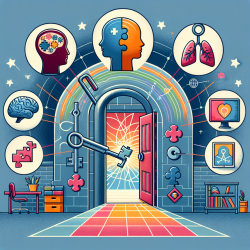Introduction
In the realm of child and adolescent mental health services (CAMHS), timely and accurate diagnosis is critical. A recent study titled "Testing an Individualized Digital Decision Assist System for the Diagnosis and Management of Mental and Behavior Disorders in Children and Adolescents" explores the potential of a Clinical Decision Support System (CDSS) to enhance diagnostic accuracy and treatment efficacy. This blog delves into the study's findings and offers insights for practitioners looking to leverage data-driven tools to improve outcomes for children.
The Role of IDDEAS in CAMHS
The Individualized Digital Decision Assist System (IDDEAS) is a pioneering CDSS developed to support clinicians in diagnosing and managing mental health disorders in children and adolescents. By integrating standardized clinical guidelines with big data analytics, IDDEAS offers real-time, evidence-based recommendations tailored to each patient.
In Norway, where approximately 20% of children and adolescents experience mental health issues, the implementation of such a system is not only innovative but necessary. The IDDEAS project aims to enhance the quality, competency, and efficiency of CAMHS, ultimately improving patient outcomes and reducing long-term adverse effects.
Research Methodology and Findings
The study employs a mixed-methods approach, encompassing four stages: needs assessment, development, evaluation, and dissemination. The evaluation phase involves both qualitative and quantitative methods to assess the system's usability, acceptability, and clinical relevance.
- Usability and Acceptability: The system's user-interface is designed collaboratively with CAMHS experts to ensure it meets clinical needs effectively.
- Clinical Relevance: IDDEAS provides customized clinical care by integrating evidence-based guidelines with patient-specific data.
Preliminary results indicate that IDDEAS enhances diagnostic accuracy and treatment planning for disorders like ADHD, a prevalent condition among Norwegian youth.
Implications for Practitioners
For practitioners, the integration of CDSS like IDDEAS into clinical practice represents a significant advancement. Here are some key takeaways:
- Enhanced Diagnostic Precision: By utilizing data-driven insights, practitioners can make more accurate diagnoses, reducing the risk of misdiagnosis and subsequent treatment failures.
- Improved Treatment Outcomes: Customized recommendations ensure that treatment plans are tailored to individual patient needs, potentially leading to better health outcomes.
- Increased Efficiency: With real-time support, clinicians can streamline their decision-making processes, allowing for more efficient patient care.
Encouraging Further Research
While the IDDEAS project shows promising results, ongoing research is essential to refine and expand its capabilities. Practitioners are encouraged to engage with this research, contribute to its development, and consider similar innovations in their practice.
To read the original research paper, please follow this link: Testing an individualized digital decision assist system for the diagnosis and management of mental and behavior disorders in children and adolescents.










